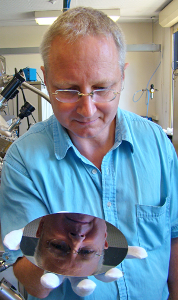Jun 5 2010
A team from University of Sydney has developed a new pulsed laser that enables generating light on a computer chip. This invention might make it possible to use silicon chips to send information at very high speeds with the help of light. The international team was led by David Moss, an associate professor of Institute of Photonics and Optical Science at the University.
 A team from University of Sydney has developed a new pulsed laser that enables generating light on a computer chip.
A team from University of Sydney has developed a new pulsed laser that enables generating light on a computer chip.
Moss commented that the newly developed laser generates very short light pulses at extremely high speeds for transmission and processing of information. Thus the laser will enable faster computing when it is executed at a large level. He noted that the pulsed laser is vital for the ultra high-speed data transmission and signal processing either between chips or on-chip.
At present, data on a chip is being shuffled with the help of electronic signals received over interconnects or copper wires. However, metal can easily get choked on the bandwidth bottleneck, Moss noted. Using light to transmit data on a silicon chip at ultra-high speed is an important invention. It is also important as the demand for faster technology is increasing all the time, he added.
Further, Moss stated that more effective methods are needed for transmitting large data around the circuit boards to meet as well as exceed the challenges. Ultimately, the new technology can lead to faster and more economic computers.